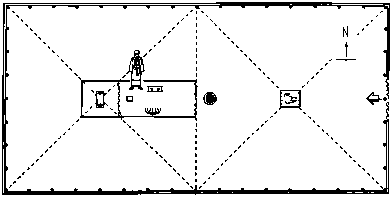Pastor Jack Sequeira's Sanctuary Teaching?
Click to go to our Home PageDear
Reader, For the benefit of others who might have the same question, I publish
the below stated question directed to me and my response to the question: Ron, I was reading this on
Jack Sequeira's web page, is he
Correct in his teaching below? THE SANCTUARY - GOD'S MODEL PLAN OF
SALVATION
Ron's response: Gar, Sequeira's Sanctuary scenario provides no
separate eternal sacrifice of the Son of God in the Heavenly Sanctuary at His
Incarnation, which, according to Ellen White and reason, was a sacrifice in
and of itself and was the only specified requirement of the Everlasting
Covenant: "The darkness
rolled away from the Saviour and from the Cross. Christ bowed His head and
died. In His Incarnation He had reached the prescribed limit as a
sacrifice, but not as a redeemer." E.G. White Manuscript Releases
Volume Twelve, p. 409. What was the prescribed
limit of the Everlasting Covenant? It was that the Testator must die. Die for
what? For the wages of our sin. What is the wages for our sin? Eternal death
and not three days in a tomb. Sequeira's view provides only for a three
day death sacrifice of the Son of God. That does not satisfy the penalty of
death for our sins, which is eternal death. Thus, Sequeira,
like all ministering brethren, are left wide open to believe the Trinity
doctrine, which, like Martin's scenario, provides no semblance of any
satisfaction of the Everlasting Covenant's specification that the Testator
must die some form of eternal death. We know that His death was to be in
payment for the penalty of the wages of sin, which is eternal death. The Son
of God met that penalty by laying aside His Holy Spirit life and soul as a
regenerating gift for us by which we can be sanctified. This provides a
remedy for sin, without which His death on the cross would have been of no
avail except to justify sin forever. Any portrayal of the
Sanctuary Service which does not teach that the Son of God made an eternal
sacrifice of His first estate life and soul, is faulty in the degree that it
totally ignores the greatest crowning gift--greatest good that was ever
proffered by our Lord and Saviour Jesus Christ. Thus, Sequeira
totally omits in his summation of the life of Christ, the greatest thing
Christ ever did for us! That is serious. That is fatal. If this factor was
recognized by the ministering brethren, they would never have been deceived
by the Trinity doctrine which makes no proviso for any form of eternal death
sacrifice on the part of the Testator. As stated, this is the same problem
with Martin Eldon's scenario--and that of Lynnford Beachy, Allan Stump and the others who teach as they do
on the Godhead. Thus, Sequeira's schematic of the
Sanctuary Service and the Life of Christ, is indeed faulty by omitting the
greatest sacrifice He made for us. "Christ declared
that after his ascension, he would send to his church, as his crowning gift,
the Comforter, who was to take his place. This Comforter is the Holy
Spirit,--the soul of his life, the efficacy of his church, the light and life
of the world. With his Spirit Christ sends a reconciling influence and a
power that takes away sin. In the gift of the
Spirit [HIS LIFE--THE SOUL OF HIS LIFE], Jesus gave to man the highest good
that heaven could bestow.... The Spirit was given as
a regenerating agency, and without this the sacrifice of Christ would have
been of no avail.... It is by the Spirit
that the heart is made pure. Through the Spirit the believer becomes a
partaker of the divine nature. Christ has given his Spirit as a divine power
to overcome all hereditary and cultivated tendencies to evil, and to impress
his own character upon the church." E.G. White, Review and Herald
Articles, May 19, 1904, vol. 5, p. 42. Ron Beaulieu |
